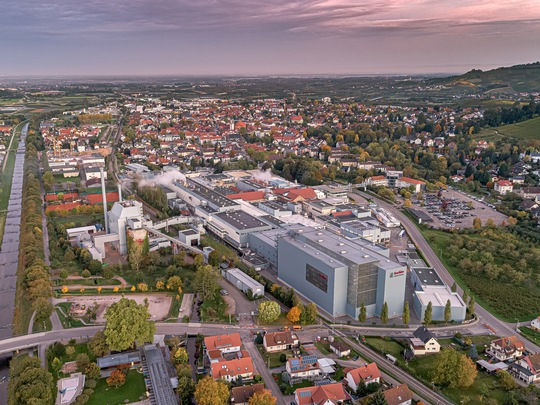
▪ Two pillars "paper" and "renewable energies" secure growth
In the 2021 financial year, the Koehler Group was able to hold its own in a challenging market and competitive environment better than predicted due to the ongoing consequences of the global Covid pandemic. As a globally active company, Koehler is highly dependent on regional and global economic conditions. The economy stabilised slightly last year, following a massive slump worldwide in 2020. The latest statistics from the Association of German Paper Mills (VDP) show a noticeable increase in production of paper, cardboard and paperboard of 8.3 per cent to 23.1 million tonnes for the calendar year 2021 compared to the corresponding period of the previous year.
Significant sales growth of 22.4 % in the 2021 business year
The industry-related general conditions were characterised by large price jumps on the energy markets. Sales revenues in the reporting year were characterised by an increase in sales volume and price increases, which were implemented on the market due to rising raw material prices and energy costs. At 941 million euros, the turnover for the 2021 financial year is significantly higher than in the previous year, by 22.4%. The operating result of 76 million euros is also 13.7 % above the previous year's level. Kai M. Furler, CEO of the Koehler Group, says: "We are pleased that we were able to satisfy our customers and significantly increase our turnover in the past financial year despite the difficult general conditions."
In addition to the challenges on the global markets, 2021 was also marked by the start of a transformation towards an even more sustainable company. The future of the Koehler Group will be determined by its efforts to implement sustainable, innovative solutions along the value chain. "The coming years will be determined by our own ambition to realise the ambitious climate protection targets we have set ourselves," Furler continues. Among the goals the company has set itself is to achieve the "Koehler Promise 2030". By 2030, Koehler wants to generate more energy from renewable sources with its own plants than is needed for its own paper production. The product portfolio will also be consistently aligned with the requirements of the circular economy.
Equity ratio of 51.5% ensures independence as a family business
The Koehler Group was founded in 1807 and has been a family-owned company from the beginning until today. Koehler is currently managed in the 8th generation by Kai M. Furler. The Group's corporate culture is based on trust, mutual respect and sustainable action. To ensure that Koehler can continue to operate independently in the long term, an equity ratio of 40% has been set as a target. At 51.5% in the past financial year, this target was clearly exceeded despite an increase in the balance sheet total, thus securing the independence of the family-owned company.
Further growth in turnover expected for the current financial year
Further significant growth in turnover is expected for the current financial year. As in the previous year, this is due to the rise in energy prices on the global market, but also to the further increase in demand for the Koehler Group's products. In particular, the early investments in renewable energies are now paying off. Koehler Renewable Energy was founded in 2012 to acquire, plan, develop and operate projects and plants. The main focus is on projects in the field of cogeneration with CO2-neutral fuels, as well as wind power, hydropower and photovoltaic plants in Germany and England.
The 2022 business year will continue to be characterised by restrictions in the supply chains. The Russian attack on Ukraine has further intensified these problems. Added to this is the difficult energy situation, which is causing global prices for goods to rise further. The limited availability of shipping capacity and sea containers exacerbates the situation.
www.koehler.com


















































































